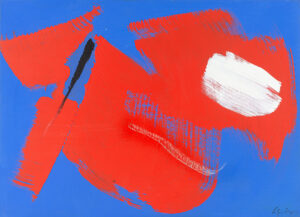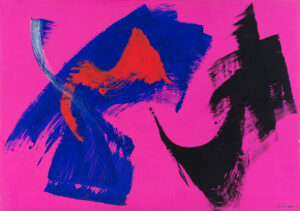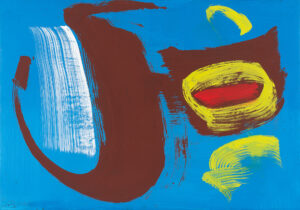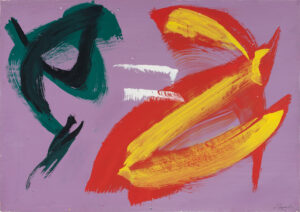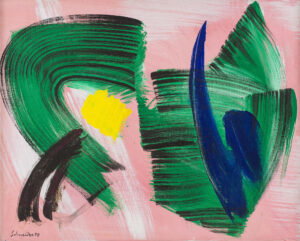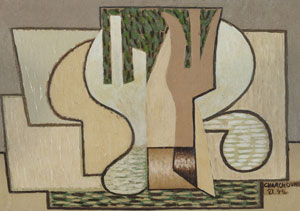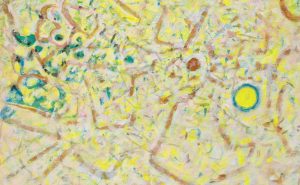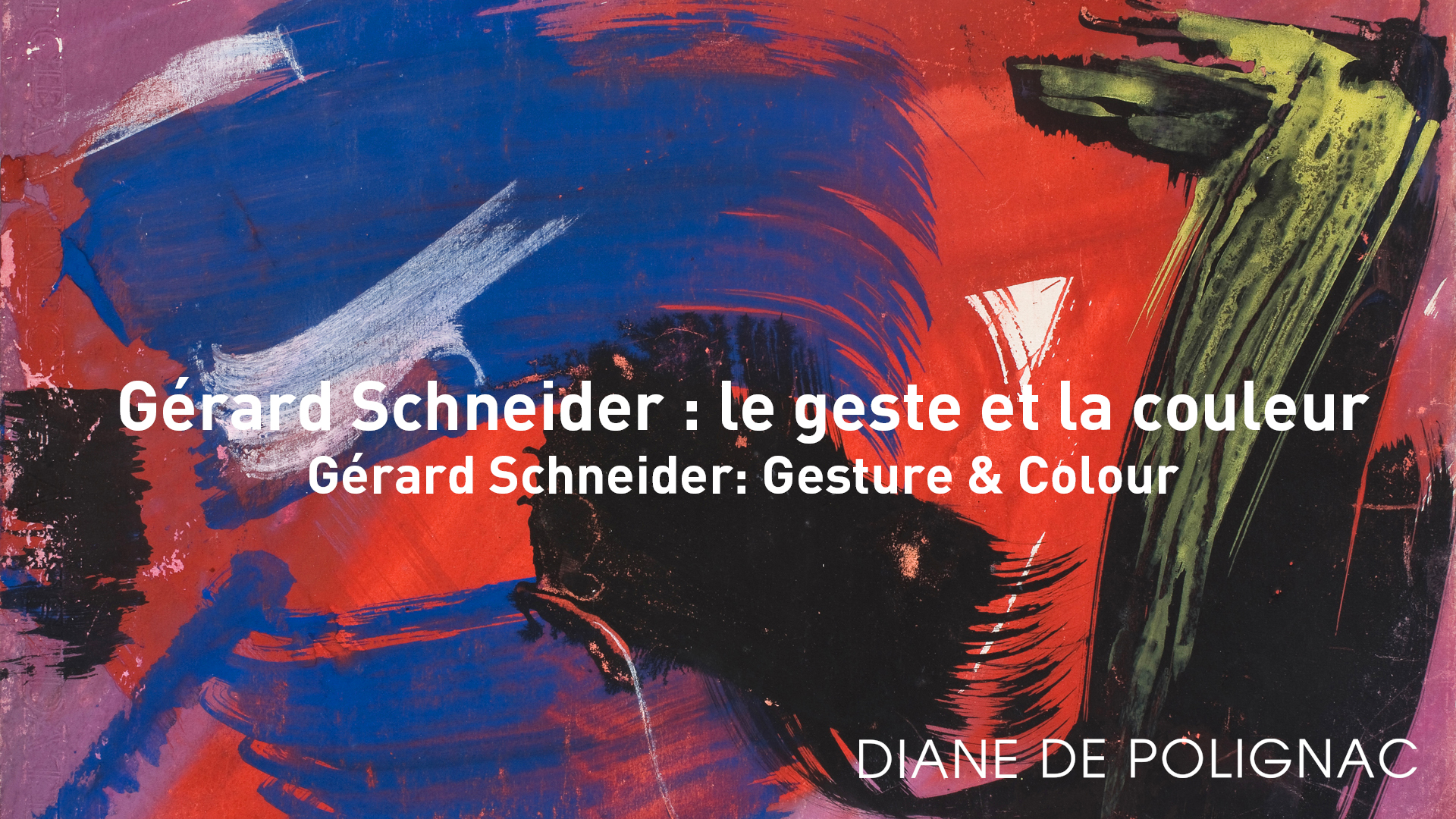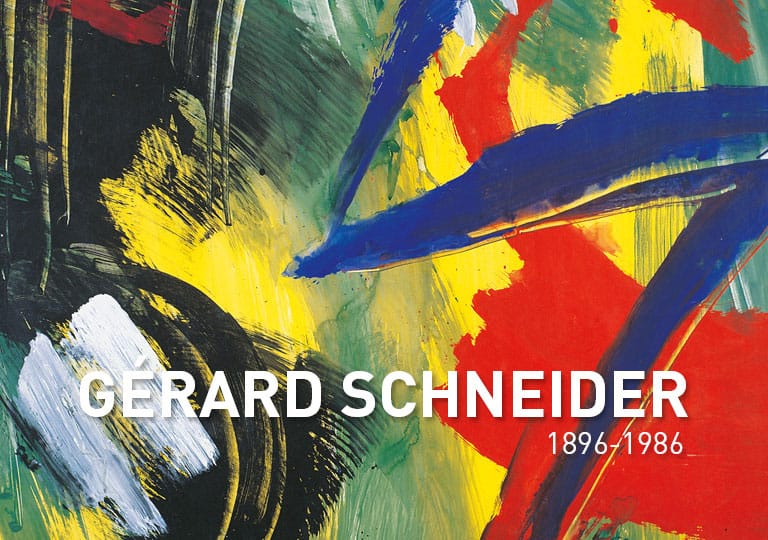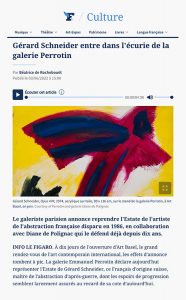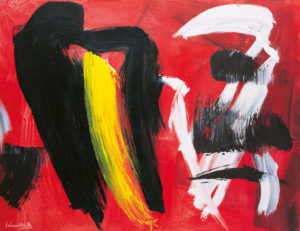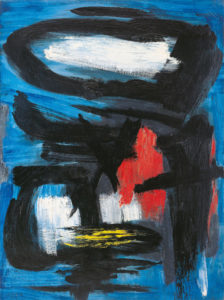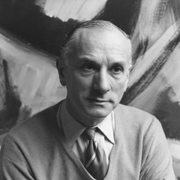
(1896-1986)
The Gallery represents the Estate of the artist Gérard Schneider since 2012. The Gallery has assisted the artist’s family in the preparation of the Catalogue raisonné and works today in close collaboration with the Gérard Schneider Archives.
Pioneer of Lyrical Abstraction, along Hans Hartung and Pierre Soulages, Gérard Schneider is a leading figure of this new, utterly free, gestural abstraction, which emerges in Post-War Paris.
Exhibitions
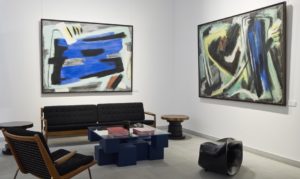
GÉRARD SCHNEIDER
1945-1955
De l’abstraction au lyrisme
SOLO SHOW
SEPTEMBER 13 – OCTOBER 15, 2017
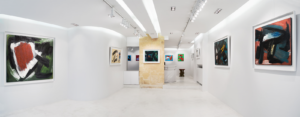
GÉRARD SCHNEIDER
SOLO SHOW
JUNE 2 – JULY 31, 2014
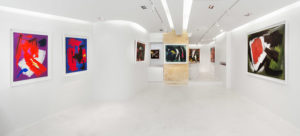
GÉRARD SCHNEIDER
SOLO SHOW
MAY 22 MAI – JULY 30, 2013
Publications

GÉRARD SCHNEIDER
Espaces colorés – Œuvres 1970-1978
Digital publication – Text by Christian Demare

GÉRARD SCHNEIDER
Lyrisme(s)
Catalog 72 pages – Texts by Laurence Schneider, Christian Demare & Astrid de Monteverde

THE 1940s
An abstract renaissance inspired by surrealist practices
Digital publication – Text by Mathilde Gubanski
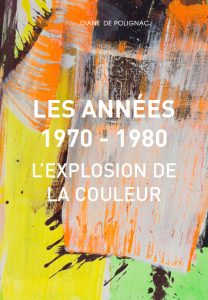
LES ANNÉES 1970 – 1980
L’EXPLOSION DE LA COULEUR
Digital publication – Text by Mathilde Gubanski

GÉRARD SCHNEIDER
The emergence of gesture
Artworks on paper 1944-19599
Digital publication – Text by Christian Demare
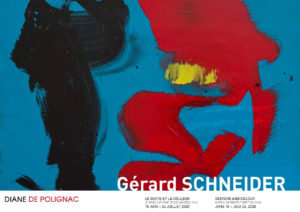
GÉRARD SCHNEIDER
Gesture and colour
Works on paper from the 1960s
Digital publication – Text by Astrid de Monteverde & Christian Demare
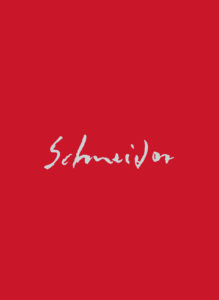
GÉRARD SCHNEIDER
1945-1955
De l’abstraction au lyrisme
Published by the Galerie Diane de Polignac
Exhibition Catalog
French & English – 86 pages – sept. 2017
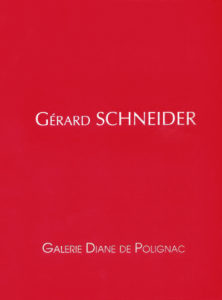
GÉRARD SCHNEIDER
Published by the Galerie Diane de Polignac
Exhibition Catalog
French & English – 96 pages – june 2014
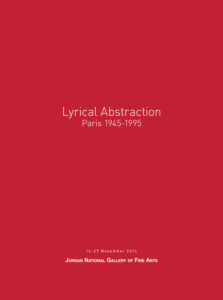
LYRICAL ABSTRACTION
PARIS 1945-1995
Published by the Galerie Diane de Polignac and the Jordan National Gallery of Fine Arts
Exhibition Catalog
English – 21 pages – nov. 2014
Videos
Atwork analysis
“FREE, VIVID AND EXPRESSIVE Gérard Schneider, the large works on paper (1983–1985)”, an analysis by Mathilde Gubanski
“Gérard Schneider The emergence of gesture”, an analysis by Christian Demare and Astrid de Monteverde
“Gérard Schneider From abstraction to lyricism 1945-1955”, an analysis by Astrid de Monteverde
Gérard Schneider & the years of study (1916-1937)
Gérard Schneider was born in Sainte-Croix in Switzerland in 1896. He spent his childhood in Neuchâtel where his father was a cabinetmaker and antique dealer.
At the age of 20, he went to Paris to study at the École nationale des arts décoratifs, and then in 1918 entered the studio of Fernand Cormon at the École Nationale des Beaux-Arts de Paris. Cormon had also taught Vincent van Gogh and Henri de Toulouse-Lautrec.
In 1922, Gérard Schneider settled permanently in Paris. The 1920s and 1930s were marked by a long period during which he learned different techniques and the history of painting.
In 1926, Gérard Schneider’s exhibition took place for the first time at the Salon d’Automne. The work he showed, L’Allée hippique (Horse Pathway), attracted attention. He also frequented musical circles in Paris. He exhibited five paintings, including Figures dans un jardin (Figures in a Garden) at the Salon des Surindépendants of 1936, which were appreciated by the critic of La Revue Moderne: “a style, figures of such agility that the expression of movement seems to have been included in the rapid technique”.
He also discovered the artistic movements of the century of upheavals and tragedies during this period.
In the mid-1930s, the painter Gérard Schneider assimilated the revolution initiated by Kandinsky’s abstraction, while also exploring the new horizons introduced by Surrealism. He no longer painted from reality. His palette darkened, black now occupied an important position and formed structures. He wrote poems and frequented the Surrealists: Luis Fernandez, Oscar Dominguez, Paul Éluard and Georges Hugnet.
Gérard Schneider towards abstraction (1938-1949)
From 1938, the titles of Gérard Schneider’s paintings no longer referred to reality: the three sent to the Salon des Surindépendants were called Composition. In 1939, he met Picasso. Around 1944, his painting definitively abandoned all references to reality.
In 1945, the Musée National d’Art Moderne bought one of Gérard Schneider’s paintings (Composition, 1944).
In the effervescence of the immediate post-war period, Gérard Schneider’s art played a pioneering role in the birth of a new form of abstraction. In Paris, the painter Gérard Schneider and other precursors proposed a return to the radicality of abstraction, a form of abstraction that no longer had any connection with the real and perceptible world and would become a landmark, it matched the aesthetic imperatives of this transitional period: it was called Lyrical Abstraction.
Gérard Schneider & the “Years of Glory” (1950-1961)
Alongside artists such as Jean-Michel Atlan, André Lanskoy, Georges Mathieu and especially Hans Hartung and Pierre Soulages with whom he formed sincere friendships, Gérard Schneider very quickly saw his work acquire an international dimension. From the mid-1940s, major exhibitions grouping the main members of lyrical abstraction were organized in Paris, especially at the galleries of Lydia Conti and Denise René.
Abroad, at major travelling exhibitions, the public discovered this vital creative momentum: around Germany from the late 1940s: this was the exhibition Wanderausstellung Französischer Abstrakter Malerei (Travelling exhibition of French abstract paintings) which circulated throughout West Germany between 1948 and 1949. Schneider’s works were exhibited immediately afterwards in the USA: at the Betty Parsons Gallery (in 1949 and 1951) and in the major travelling exhibition Advancing French Art that was shown all over the country, from Chicago to San Francisco.
Between 1955 and 1961, the Samuel Kootz Gallery in New York was his exclusive dealer in the USA and his representative there. The painter Gérard Schneider joined his friend Pierre Soulages in this prestigious gallery.
The Phillips Gallery of Washington bought Opus 445 of 1950 and New York’s MoMA bought Opus 95 B of 1955.
In 1956, Gérard Schneider married for the second time, his wife was Loïs Frederick a young American woman who had come to Paris to study art on a Fulbright scholarship, whom he met through Marcel Brion. Around the same time, Schneider met Eugène Ionesco.
Exhibitions were held successively around the world.
From the early 1950s, Gérard Schneider’s works were exhibited in Europe: for example, in Brussels where there was a first retrospective in 1953, then a second one in 1962 in association with the Düsseldorf Kunstverein. He also participated in the first two editions of Documenta in Kassel in 1955 and 1959.
Gérard Schneider exhibited three times at the Venice Biennale, in 1948, 1954 and 1966.
In 1957, he won the award Prix Lissone.
His works also travelled regularly, to Japan from 1950 until the early 1970s, especially for the International Exposition of Art. In addition, for the International Art Exhibition in Tokyo in 1959, he was awarded the prize of the Governor of Tokyo.
The painter Gérard Schneider also showed several times at the São Paulo Biennale: in 1951, 1953 and 1961. During the 1961 edition, Jean Cassou, chief curator of the Musée National d’Art Moderne of Paris, asked Schneider to create four canvas paintings 2 x 3 m for a group of ten large format works that were exhibited.
Gérard Schneider & the “Years of Enlightenment” (1962-1972)
During the 1960s, he maintained a close connection with the Milan-based dealer, Bruno Lorenzelli who held many exhibitions of his work around Italy. This decade of change saw Gérard Schneider’s painting acquiring more colour, becoming freer while the gesture acquired a definitively calligraphic dimension.
Yet again, Gérard Schneider’s work evolved and echoed the aesthetic aspirations of his time as much as a complex interior process that had begun many years earlier. A synthesis of the notions of form, colour and space.
At the 1966 Venice Biennale, an entire room of the French Pavilion was devoted to his work.
Similarly, a major retrospective was held of his work in Turin in 1970 where about a hundred paintings were exhibited at the Galleria Civica d’Arte Moderna. This was a great success, and then the exhibition continued at the “Terre des Hommes” Pavilion in Montreal.
Gérard Schneider : maturity and the large works on paper (1973-1986)
At over 70, Gérard Schneider’s art continued its effervescence. The fire was still as intense. The volcanic eruption of colour more fervent than ever, as if his work was destined never to be extinguished.
Exhibitions of the painter Gérard Schneider continued at the same pace, such as those held by the Galerie Beaubourg in Paris.
This fire, this energy, required a speed of execution that only paper seemed to allow. At the start of the 1980s, he turned towards this support almost exclusively. This is how, in the intimacy of his studio, large and luminous compositions full of colour were born, enflamed, the unreal beauty of which continue to fascinate.
The painter Gérard Schneider left this world on July 8th 1986 at the age of 90 and bequeathed us an oeuvre that was both simultaneously unfathomable in its aesthetic complexity and yet so close, so human and so sensitive.
In 1998, Michel Ragon published a major monograph on his work.
The Diane de Polignac Gallery accompanied Laurence Schneider, daughter of the artist, in the creation of the Catalogue raisonné. Today, the Gérard Schneider Archives continue this essential research work in order to keep this Catalogue raisonné up to date, as it is a fundamental tool for understanding the work.
© Diane de Polignac Gallery / Astrid de Monteverde
Translation: Jane Mac Avock
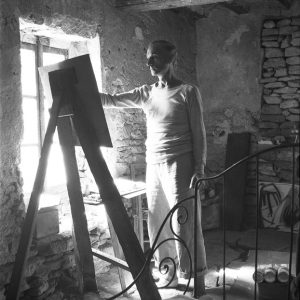
Gérard Schneider in Gordes, 1946
Reserved rights
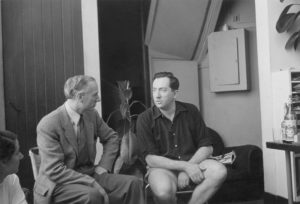
Gérard Schneider and Pierre Soulages, ca. 1950
Reserved rights
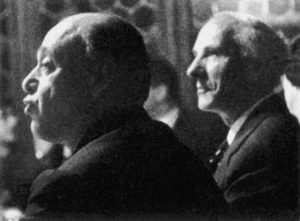
Eugène Ionesco and Gérard Schneider, Saint-Gall, 1961
Reserved rights
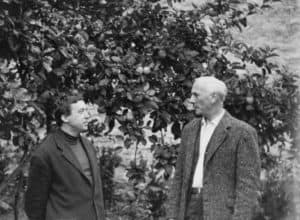
Michel Ragon and Gérard Schneider, 1960’s
Reserved rights
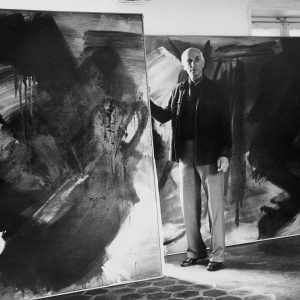
Gérard Schneider in his studio, 1972
Photo by André Villers – Reserved rights
SELECTED COLLECTIONS
Selected collections
Brussels, Musée d’art Moderne
Buffalo, NY, Albright-Knox Art Gallery
Cologne, Ludwig Museum
Colorado Springs, Co, Fine Art Center
Dunkerque (France), LAAC
Geneva, Fondation Gandur pour l’Art
Jakarta, Museum
Kamakura (Japan), Museum of State
Los Angeles, Ca, University of California
Minneapolis, Mn, Walker Art Center
Nantes, Musée d’Arts
Neuchâtel (Switzerland), Musée d’Art et d’Histoire
New Haven, Ct, Yale University
New York, NY, Museum of Modern Art (MoMA)
Oslo, Sonja Henie and Niels Onstad Foundation
Paris, Musée d’Art Moderne de Paris
Paris, Musée national d’Art Moderne – Centre Pompidou
Phoenix, Az, Phoenix Museum
Princeton, Ma, Princeton University
Rome, Galleria d’Arte Moderna
Rio de Janeiro, Museu de Arta Moderna do Rio de Janeiro
Saint-Louis, Mo, Washington University
Seoul, Fine Art museum
Torino, Galleria civica d’Arte Moderna
Washington D.C., The Phillips Collection
Worchester, Ma, Worchester Museum
Zurich, Kunsthaus
SELECTED EXHIBITIONS
Selected exhibitions
Galerie Denise René, Paris, 1946, 1947, 1948, 1953
Galerie Lydia Conti, Paris, 1947, 1948, 1950
Venice Biennale, 1948, 1954, 1966
Wanderausstellung Französischer Abstrakter Malerei (Travelling exhibition of French abstract paintings), travelling group show in West Germany: Stuttgart, Munich, Düsseldorf, Hanover, Hamburg, Frankfurt am Main, Freiburg im Breisgau, 1948-1949
Betty Parsons Gallery, New York, 1949, 1951
Les grands courants de la peinture contemporaine (de Manet à nos jours), travelling group show in South America, 1949-1950
Advancing French Art, travelling group show in United States of America: Louisville, Bloomington, San Francisco, Chicago and Washington, 1951-1952
São Paulo Biennale, 1951, 1954, 1961
Der Spiegel Gallery, Cologne, 1952, 1953, 1955, 1957, 1981
Otto Stangl Gallery, Munich, 1952
International Art Exhibition, travelling group show in Japan, 1953-1965
Gérard Schneider, retrospective, Palais des Beaux-Arts, Brussels, 1953
Galerie Arnaud, Paris, 1954, 1959, 1965, 1967, 1968, 1970
Documenta in Kassel, 1955, 1959
Kootz Gallery, New York, 1956-1961
Galerie Apollinaire, Milan, 1958
Albright-Knox Art Gallery, Buffalo, NY, 1958, 1959, 1966, 1972
Galleria Lorenzelli, Milan, 1960, 1961, 1965, 1972, 1974, 1986, 1989, 2012
Minami Gallery, Tokyo, 1960
Nakanoshima Gallery, Osaka, 1960
Im Erker Gallery, Saint-Gall, 1961, 1963
Salon de Mai in Japan, Tokyo, Osaka, 1962
Gérard Schneider, retrospective, travelling exhibition: Kunstverein, Düsseldorf / Palais des Beaux-Arts, Brussels, 1962
Paintings in France 1900-1967, travelling group show in United States of America: New York, Boston, Chicago, San Francisco and in Canada, 1968
Gérard Schneider, retrospective, Galleria civica d’Arte moderna, Turin, 1970 Pavillon Terre des Hommes, Montreal, 1970
Panorama de l’Art contemporain, travelling group show in Iran, Egypt, Greece, Turkey, Syria, Morocco, Algeria, Tunisia, Lebanon, 1971-1972
Galerie Beaubourg, Paris, 1974, 1975, 1977, 1981, 1986
Gérard Schneider, retrospective, Musée d’Art et d’Histoire, Neuchâtel (Switzerland) / Musée d’Art Contemporain, Dunkerque (France), 1983
FIAC, Galerie Patrice Trigano, Paris, 1983 Kunstmesse, Basel, 1985
L’Europe des grands maîtres, Musée Jacquemart-André, Paris / Musée des beaux-arts, Seoul, 1989
Schneider, reetrospective, travelling retrospective in France: Clermont-Ferrand, Carcassonne, Montbéliard, Le Mans, Metz, 1998-2001
L’Envolée lyrique, Paris 1945-1956, Musée du Luxembourg, Paris, 2006
Gérard Schneider, grands gestes pour un grand monde, Musée d’Art & d’Histoire,
Neuchâtel (Switzerland), 2011
Montparnasse / Saint-Germain-des-Prés, Angers / Bordeaux (France), 2012
Les Sujets de l’abstraction, Peinture non- gurative de la Seconde École de Paris (1946- 1962), group show, Fondation Gandur pour l’Art, Musée Rath, Geneva / Musée Fabre, Montpellier, 2011
Gérard Schneider, retrospective, Musée des Beaux-Arts d’Orléans (France), 2013
Le Geste et la Matière – Une abstraction « autre » – Paris, 1945-1965, Fondation Clément, Le François, Martinique, 2017
Opus 12 M – 1977
Acrylic on canvas
35 x 45.6 in. – 89 x 116 cm
Private collection, France
SELECTED BIBLIOGRAPHY
Selected bibliography
Marcel Pobé, Schneider, Paris, Georges Fall, 1959
Michel Ragon, Schneider, Amriswill, Bodensee Verlag, 1961
Marcel Brion, R. V. Gindertael, Schneider, Venice, Al eri, 1967
Gérard Schneider, exhibition catalog, Turin, Galleria civica d’Arte moderna (16 April–24 May 1970), Turin, Galleria civica d’Arte moderna, 1970
Gérard Schneider, Eugène Ionesco (foreword), Mots au vol, Paris, Éditions Saint-Germain- des- Prés, 1974
Pierre von Allmen (dir.), Jean-Marie Dunoyer, Schneider, exhibition catalog, Neuchâtel, Musée d’Art et d’Histoire (26 February–17 April 1983), Neuchâtel, Musée d’Art et d’Histoire de Neuchâtel, 1983
Jean Orizet, Schneider Peintures, Paris, La différence / l’autre musée, 1984
Daniel Chabrissoux, Loïs Frederick, Gérard Schneider: œuvres de 1916 à 1986, exhibition
Lydia Harambourg, L’Ecole De Paris, 1945-1965 : Dictionnaire Des Peintres, Lausanne, Ides et Calendes, 1993
catalog, Angers, (1991), Angers, Expressions contemporaines, 1991 Michel Ragon, Schneider, Angers, Expressions contemporaines, 1998
Patrick-Gilles Persin, L’Envolée lyrique Paris 1945-1956, exhibition catalog, Paris, Musée du Luxembourg (26 April–6 August 2006), Milan, Skira, 2006
Lydia Harambourg, L’École de Paris, 1945-1965, Dictionnaire des peintres, Ides et Calendes, Neuchâtel, 1993, (update by Clotilde Scordia, Ides et Calendes, Neuchâtel, 2010)
Éric de Chassey (dir.), Éveline Notter (dir.), Justine Moeckli et al., Les sujets de l’abstraction. Peinture non- figurative de la seconde École de Paris, 1946-1962. 101 Chefs- d’œuvre de la Fondation Gandur pour l’Art, exhibition catalog, Geneva, Musée Rath (6 May–14 August 2011) / Montpellier, Musée Fabre (3 December 2011–25 March 2012), Milan, 5 continents, 2011
Christian Briend, Nathalie Ernoult, Le Geste et la Matière – Une abstraction « autre » – Paris, 1945-1965, exhibition catalog, Le François, Martinique, Fondation Clément (22 January–16 April 2017), Paris / Le François, Centre Pompidou, Paris / Fondation Clément, Le François, Martinique / Somogy éditions d’Art, 2017
Opus 87 B – 1955
Oil on canvas
51.1 x 38.1 in. – 130 x 97 cm
Private collection, France
Gérard Schneider Faq
On the GÉRARD SCHNEIDER FAQ page, find all the questions and answers dedicated to the modern art painter Gérard Schneider.





